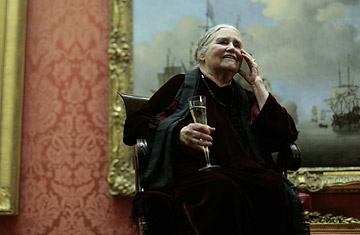
British author Doris Lessing listens to a speaker at the Wallace Collection in London.
Even at 88, Nobel Laureate Doris Lessing refuses to play the role of Britain's elder literary stateswoman. "As you get older, you don't get wiser," she says. "You get irritable." Her latest book, Alfred and Emily (out in the U.S. on August 5), recounts her childhood on a farm in Southern Rhodesia, and examines the profound effects of World War I on her father, a former soldier and amputee, and her mother, a nurse whose true love drowned in the English Channel. On the eve of the book's publication in the U.K., Lessing spoke with TIME's William Lee Adams at her home in London.
When reporters informed you that you had won the Nobel Prize last October, your first words were "Oh, Christ." Were you at all excited? No, I wasn't. If I may be catty, Sweden doesn't have anything else. There's not a great literary tradition, so they make the most of the Nobel.
The Nobel committee described you as the "epicist of the female experience." Do you agree with that? Well, they had to say something.
But do you agree with it? No. I can just see somebody sitting there thinking, "What the hell are we going to say about this one? She doesn't like being called a feminist so what'll we say?" So they scribbled that.
Is Alfred and Emily your final book? Yes. I haven't got the energy to write now. I used to have so much energy I didn't know what to do with it, but now it just runs away from me. When you're young you think that you're going to sail into a lovely lake of quietude and peace. This is profoundly untrue.
In the book you say that the First World War squatted over your childhood. How so? My father and my mother, I now see, were very much done in by World War I. My father was always so mingled with rage at his life. He got severe diabetes, and a whole lot of other ills come with that. He became an invalid and passive, which was not his nature at all. It took me a very long time to see that I'd never really known him.
What about your mother? It took me much longer to realize that my mother was badly damaged too. She was this immensely unused woman. She put all of her energy into my brother and myself, which was very bad for us and very bad for her too.
Was that her nature? No. She had a bad breakdown when she found that she was stuck on the farm [in Rhodesia]. She turned into this self-pitying woman who started to live through her children. All my friends' mothers were appalling women. They had nothing in their lives — of course, husbands are just something you look after.
You say that as a child you hated her. Did that feeling dissipate? No, it didn't. It was not a good relationship and I can't remember a time I wasn't fighting her. As time went on it turned into my always running away from her, but then she would always run after me.
Do you think she loved you? I think that my mother was not a maternal woman. She shouldn't have had children. Has it ever occurred to you that until the happy advent of birth control there were women with no maternal instinct whatsoever who would have up to ten children because that's what women did? What a nightmare.
You've had three children? Yes.
Why did you want them? Look, I'm talking about the Second World War when all girls said, "Oh no, I'm not going to bring another child into this horrible world," but then instantly had children. And I hear girls saying, "Oh I'm not going to bring a child into this wicked world," which means they are going to be pregnant next week. I don't think that our destinies are ruled by what we want at all.
Were you worried that you would become a woman who lives through her children? No, I didn't think that I was likely to. You know, if you're trying to write you don't have much energy left over to be obsessed with your children.
You've outlived one of your children. How did he pass away? He was a coffee farmer [in Africa]. There was a very bad drought. He was a man who cared very much about the trees, rivers, animals, birds. The drought dried the rivers up and killed the trees. He was absolutely torn up by this drought and had a heart attack. I maintain that if he had stuck it out he would be alive now. The rains came the day after he died.
You were a prohibited alien in South Africa and Rhodesia for 30 years for speaking out against apartheid and white rule. What do you think of Robert Mugabe? He's a monstrous little terror. Mbeki from South Africa supports him and a lot of the other black leaders have only just decided that he's bad. They don't like to criticize one of their own. Mugabe has created a caste, a layer of people just like himself who are corrupt and crooked. It's not a question of just getting rid of Mugabe and everything will be alright because it won't be.
Will you visit Zimbabwe again? Good God no. It's ruined. Under the whites it was an extremely efficient country. It could grow absolutely anything. We had railways and post offices and roads and water that worked. You can't just put that back overnight.
People have written that you are contrarian. Do you agree with that? I tend to speak my mind, which is not necessarily a good idea. I do not think I am the soul of tact.
